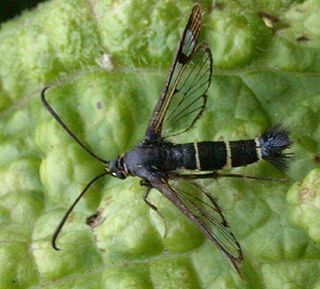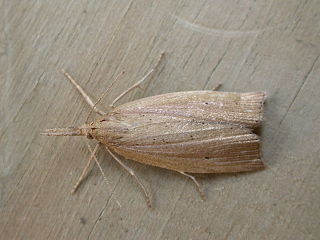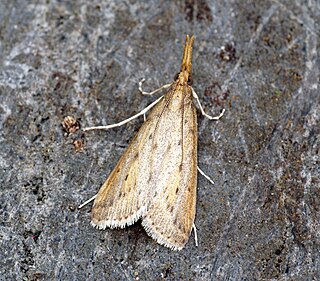| Bissetia | |
|---|---|
| Scientific classification | |
| Kingdom: | Animalia |
| Phylum: | Arthropoda |
| Class: | Insecta |
| Order: | Lepidoptera |
| Family: | Crambidae |
| Subfamily: | Crambinae |
| Tribe: | Haimbachiini |
| Genus: | Bissetia Kapur, 1950 [1] |
| Synonyms | |
| |
| Bissetia | |
|---|---|
| Scientific classification | |
| Kingdom: | Animalia |
| Phylum: | Arthropoda |
| Class: | Insecta |
| Order: | Lepidoptera |
| Family: | Crambidae |
| Subfamily: | Crambinae |
| Tribe: | Haimbachiini |
| Genus: | Bissetia Kapur, 1950 [1] |
| Synonyms | |
| |

The Sesiidae or clearwing moths are a diurnal moth family in the order Lepidoptera known for their Batesian mimicry in both appearance and behaviour of various Hymenoptera.

Crambinae is a large subfamily of the lepidopteran family Crambidae, the crambid snout moths. It currently includes over 1,800 species worldwide. The larvae are root feeders or stem borers, mostly on grasses. A few species are pests of sod grasses, maize, sugar cane, rice, and other Poaceae. The monophyly of this group is supported by the structure of the tympanal organs and the phallus attached medially to the juxta, as well as genetic analyses.

The genus Crambus includes around 155 species of moths in the family Crambidae, distributed globally. The adult stages are called crambid snout moths, while the larvae of Crambus and the related genus Herpetogramma are the sod webworms, which can damage grasses.

Ancylolomia is a genus of moths of the family Crambidae described by Jacob Hübner in 1825.

Calamotropha is a genus of moths of the family Crambidae.
Charltona is a genus of moths of the family Crambidae. The genus was erected by Charles Swinhoe in 1886.

Chilo is a genus of moths of the family Crambidae. Some of these moths are called borers.

Cirrhochrista is a genus of moths of the family Crambidae described by Julius Lederer in 1863.
Donacoscaptes is a genus of moths of the family Crambidae.
Erupa is a genus of moths of the family Crambidae.
Haimbachia is a genus of moths of the family Crambidae.
Pseudocatharylla is a genus of moths of the family Crambidae.
Prionapteryx is a genus of moths of the family Crambidae.

Schoenobiinae is a subfamily of the lepidopteran family Crambidae. The subfamily was described by Philogène Auguste Joseph Duponchel in 1846.
Bissetia leucomeralis is a moth in the family Crambidae. It was described by George Hampson in 1919. It is found in Sierra Leone.
Bissetia poliella is a moth in the family Crambidae. It was described by George Hampson in 1919. It is found in Ghana, Malawi, Nigeria and Uganda.
Bissetia steniellus is a moth in the family Crambidae. It was first described by the British entomologist George Hampson in 1899. It is found in India and Vietnam where it is commonly known as the Gurdaspur borer because the larvae bore their way into and feed on the stems of sugarcane.
Bissetia subfumalis is a moth in the family Crambidae. It was described by George Hampson in 1896. It is found in Australia, where it has been recorded from the Northern Territory.